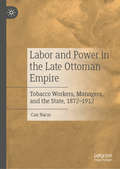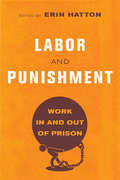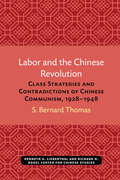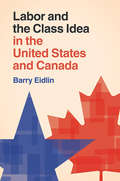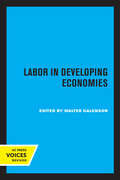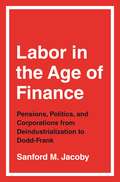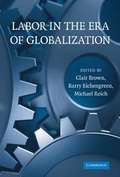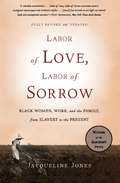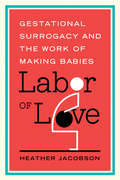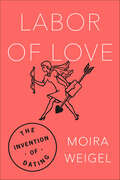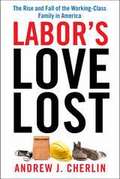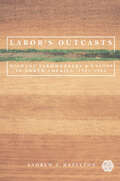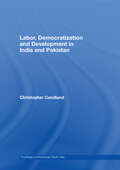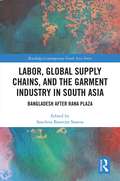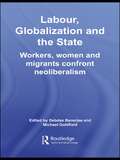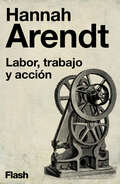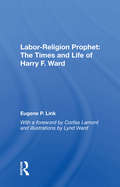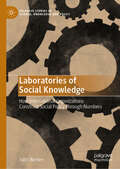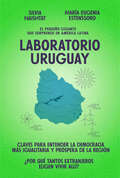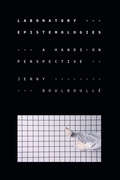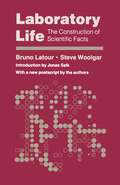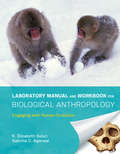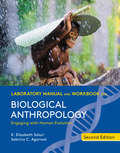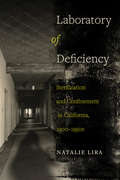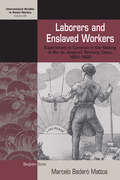- Table View
- List View
Labor and Power in the Late Ottoman Empire: Tobacco Workers, Managers, and the State, 1872–1912
by Can NacarBy the early twentieth century, consumers around the world had developed a taste for Ottoman-grown tobacco. Employing tens of thousands of workers, the Ottoman tobacco industry flourished in the decades between the 1870s to the First Balkan War—and it became the locus of many of the most active labor struggles across the empire. Can Nacar delves into the lives of these workers and their fight for better working conditions. Full of insight into the changing relations of power between capital and labor in the Ottoman Empire and the role played by state actors in these relations, this book also draws on a rich array of primary sources to foreground the voices of tobacco workers themselves.
Labor and Punishment: Work in and out of Prison
by Erin HattonThe insightful chapters in this volume reveal the multiple and multifaceted intersections between mass incarceration and neoliberal precarity. Both mass incarceration and the criminal justice system are profoundly implicated in the production and reproduction of the low-wage "exploitable" precariat, both within and beyond prison walls. The carceral state is a regime of labor discipline—and a growing one—that extends far beyond its own inmate labor. This regime not only molds inmates into compliant workers willing and expected to accept any "bad" job upon release but also compels many Americans to work in such jobs under threat of incarceration, all the while bolstering their "exploitability" and socioeconomic marginality. Contributors include Anne Bonds, Philip Goodman, Amanda Bell Hughett, Caroline M. Parker, Gretchen Purser, Jacqueline Stevens, and Noah D. Zatz.
Labor and the Chinese Revolution: Class Strategies and Contradictions of Chinese Communism, 1928–1948 (Michigan Monographs In Chinese Studies #49)
by S. Bernard ThomasIn the two-decade period from 1928 to 1948, the proletarian themes and issues underlying the Chinese Communist Party’s ideological utterances were shrouded in rhetoric designed, perhaps, as much to disguise as to chart actual class strategies. Rhetoric notwithstanding, a careful analysis of such pronouncements is vitally important in following and evaluating the party’s changing lines during this key revolutionary period. The function of the “proletariat” in the complex of policy issues and leadership struggles which developed under the precarious circumstances of those years had an importance out of all proportion to labor’s relatively minor role in the post-1927 Communist led revolution. [1, 2]
Labor and the Class Idea in the United States and Canada (Cambridge Studies In Contentious Politics )
by Barry EidlinWhy are unions weaker in the US than in Canada, two otherwise similar countries? <P><P>This difference has shaped politics, policy, and levels of inequality. Conventional wisdom points to differences in political cultures, party systems, and labor laws. But Barry Eidlin's systematic analysis of archival and statistical data shows the limits of conventional wisdom, and presents a novel explanation for the cross-border difference. <P>He shows that it resulted from different ruling party responses to worker upsurge during the Great Depression and World War II. Paradoxically, US labor's long-term decline resulted from what was initially a more pro-labor ruling party response, while Canadian labor's relative long-term strength resulted from a more hostile ruling party response. These struggles embedded 'the class idea' more deeply in policies, institutions, and practices than in the US. In an age of growing economic inequality and broken systems of political representation, Eidlin's analysis offers insight for those seeking to understand these trends, as well as those seeking to change them.<P> Provides a novel theory of American exceptionalism.<P> Presents the most comprehensive and systematic assessment ever of explanations for US union decline.<P> Written in an accessible style, with carefully explained graphs using only descriptive statistics.
Labor in Developing Economies
by Walter GalensonThis title is part of UC Press's Voices Revived program, which commemorates University of California Press’s mission to seek out and cultivate the brightest minds and give them voice, reach, and impact. Drawing on a backlist dating to 1893, Voices Revived makes high-quality, peer-reviewed scholarship accessible once again using print-on-demand technology. This title was originally published in 1962.
Labor in the Age of Finance: Pensions, Politics, and Corporations from Deindustrialization to Dodd-Frank
by Sanford M. JacobyFrom award-winning economic historian Sanford M. Jacoby, a fascinating and important study of the labor movement and shareholder capitalismSince the 1970s, American unions have shrunk dramatically, as has their economic clout. Labor in the Age of Finance traces the search for new sources of power, showing how unions turned financialization to their advantage.Sanford Jacoby catalogs the array of allies and finance-based tactics labor deployed to stanch membership losses in the private sector. By leveraging pension capital, unions restructured corporate governance around issues like executive pay and accountability. In Congress, they drew on their political influence to press for corporate reforms in the wake of business scandals and the financial crisis. The effort restrained imperial CEOs but could not bridge the divide between workers and owners. Wages lagged behind investor returns, feeding the inequality identified by Occupy Wall Street. And labor’s slide continued.A compelling blend of history, economics, and politics, Labor in the Age of Finance explores the paradox of capital bestowing power to labor in the tumultuous era of Enron, Lehman Brothers, and Dodd-Frank.
Labor in the Era of Globalization
by Clair Brown Barry Eichengreen Michael ReichThe third quarter of the twentieth century was a golden age for labor in the advanced industrial countries, characterized by rising incomes, relatively egalitarian wage structures, and reasonable levels of job security. The subsequent quarter-century has seen less positive performance along a number of these dimensions. This period has instead been marked by rapid globalization of economic activity that has brought increased insecurity to workers. The contributors to this volume, prominent scholars from the United States, Europe, and Japan, distinguish four explanations for this historic shift. These include 1) rapid development of new technologies; 2) global competition for both business and labor; 3) deregulation of industry with more reliance on markets; and 4) increased immigration of workers, especially unskilled workers, from developing countries. In addition to analyzing the causes of these trends, the contributors also investigate important consequences, ranging from changes in collective bargaining and employment relations to family formation decisions and incarceration policy.
Labor of Love, Labor of Sorrow: Black Women, Work, and the Family, from Slavery to the Present
by Jacqueline JonesThe forces that shaped the institution of slavery in the American South endured, albeit in altered form, long after slavery was abolished. Toiling in sweltering Virginia tobacco factories or in the kitchens of white families in Chicago, black women felt a stultifying combination of racial discrimination and sexual prejudice. And yet, in their efforts to sustain family ties, they shared a common purpose with wives and mothers of all classes. InLabor of Love, Labor of Sorrow, historian Jacqueline Jones offers a powerful account of the changing role of black women, lending a voice to an unsung struggle from the depths of slavery to the ongoing fight for civil rights.
Labor of Love: Gestational Surrogacy and the Work of Making Babies
by Heather JacobsonWhile the practice of surrogacy has existed for millennia, new fertility technologies have allowed women to act as gestational surrogates, carrying children that are not genetically their own. While some women volunteer to act as gestational surrogates for friends or family members, others get paid for performing this service. The first ethnographic study of gestational surrogacy in the United States, Labor of Love examines the conflicted attitudes that emerge when the ostensibly priceless act of bringing a child into the world becomes a paid occupation. Heather Jacobson interviews not only surrogate mothers, but also their family members, the intended parents who employ surrogates, and the various professionals who work to facilitate the process. Seeking to understand how gestational surrogates perceive their vocation, she discovers that many regard surrogacy as a calling, but are reluctant to describe it as a job. In the process, Jacobson dissects the complex set of social attitudes underlying this resistance toward conceiving of pregnancy as a form of employment. Through her extensive field research, Jacobson gives readers a firsthand look at the many challenges faced by gestational surrogates, who deal with complicated medical procedures, delicate work-family balances, and tricky social dynamics. Yet Labor of Love also demonstrates the extent to which advances in reproductive technology are affecting all Americans, changing how we think about maternity, family, and the labor involved in giving birth. For more, visit http://www.heatherjacobsononline.com/
Labor of Love: The Invention of Dating
by Moira Weigel“An occasionally amusing and often provocative look at the work of wooing . . . [A] lively tour of changing romantic mores.” —The Economist“Does anyone date anymore?” Today, the authorities tell us that courtship is in crisis. But when Moira Weigel dives into the history of sex and romance in modern America, she discovers that authorities have always said this. Ever since young men and women started to go out together, older generations have scolded them: That’s not the way to find true love. The first women who made dates with strangers were often arrested for prostitution; long before “hookup culture,” there were “petting parties”; before parents worried about cell phone apps, they fretted about joyrides and “parking.” Dating is always dying. But this does not mean that love is dead. It simply changes with the economy. Dating is, and always has been, tied to work.Lines like “I’ll pick you up at six” made sense at a time when people had jobs that started and ended at fixed hours. But in an age of contract work and flextime, many of us have become sexual freelancers, more likely to text a partner “u still up?” Weaving together over one hundred years of history with scenes from the contemporary landscape, Labor of Love offers a fresh feminist perspective on how we came to date the ways we do. This isn’t a guide to “getting the guy.” There are no ridiculous “rules” to follow. Instead, Weigel helps us understand how looking for love shapes who we are—and hopefully leads us closer to the happy ending that dating promises.
Labor's Love Lost: The Rise and Fall of the Working-Class Family In America
by Andrew J. CherlinTwo generations ago, young men and women with only a high-school degree would have entered the plentiful industrial occupations which then sustained the middle-class ideal of a male-breadwinner family. Such jobs have all but vanished over the past forty years, and in their absence ever-growing numbers of young adults now hold precarious, low-paid jobs with few fringe benefits. Facing such insecure economic prospects, less-educated young adults are increasingly forgoing marriage and are having children within unstable cohabiting relationships. This has created a large marriage gap between them and their more affluent, college-educated peers. In Labor's Love Lost, noted sociologist Andrew Cherlin offers a new historical assessment of the rise and fall of working-class families in America, demonstrating how momentous social and economic transformations have contributed to the collapse of this once-stable social class and what this seismic cultural shift means for the nation's future. Drawing from more than a hundred years of census data, Cherlin documents how today's marriage gap mirrors that of the Gilded Age of the late-nineteenth century, a time of high inequality much like our own. Cherlin demonstrates that the widespread prosperity of working-class families in the mid-twentieth century, when both income inequality and the marriage gap were low, is the true outlier in the history of the American family. In fact, changes in the economy, culture, and family formation in recent decades have been so great that Cherlin suggests that the working-class family pattern has largely disappeared. Labor's Love Lost shows that the primary problem of the fall of the working-class family from its mid-twentieth century peak is not that the male-breadwinner family has declined, but that nothing stable has replaced it. The breakdown of a stable family structure has serious consequences for low-income families, particularly for children, many of whom underperform in school, thereby reducing their future employment prospects and perpetuating an intergenerational cycle of economic disadvantage. To address this disparity, Cherlin recommends policies to foster educational opportunities for children and adolescents from disadvantaged families. He also stresses the need for labor market interventions, such as subsidizing low wages through tax credits and raising the minimum wage. Labor's Love Lost provides a compelling analysis of the historical dynamics and ramifications of the growing number of young adults disconnected from steady, decent-paying jobs and from marriage. Cherlin's investigation of today's "would-be working class" shines a much-needed spotlight on the struggling middle of our society in today's new Gilded Age.
Labor's Outcasts: Migrant Farmworkers and Unions in North America, 1934-1966 (Working Class in American History)
by Andrew J. HazeltonIn the mid-twentieth century, corporations consolidated control over agriculture on the backs of Mexican migrant laborers through a guestworker system called the Bracero Program. The National Agricultural Workers Union (NAWU) attempted to organize these workers but met with utter indifference from the AFL-CIO. Andrew J. Hazelton examines the NAWU's opposition to the Bracero Program against the backdrop of Mexican migration and the transformation of North American agriculture. His analysis details growers’ abuse of the program to undercut organizing efforts, the NAWU's subsequent mobilization of reformers concerned by those abuses, and grower opposition to any restrictions on worker control. Though the union's organizing efforts failed, it nonetheless created effective strategies for pressuring growers and defending workers’ rights. These strategies contributed to the abandonment of the Bracero Program in 1964 and set the stage for victories by the United Farm Workers and other movements in the years to come.
Labor, Democratization and Development in India and Pakistan (Routledge Contemporary South Asia Series)
by Christopher CandlandIn this first comparative study of organized labor in India and Pakistan, the author analyses the impact and role of organized labor in democratization and development. The study provides a unique comparative history of Indian and Pakistani labor politics. It begins in the early twentieth century, when permanent unions first formed in the South Asian Subcontinent. Additionally, it offers an analysis of changes in conditions of work andterms of service in India and Pakistan and of organized labor’s response. The conclusions shed new light on the influence of organized labor in national politics, economic policy, economic welfare and at the workplace. It is demonstrated that the protection of workers has desirable outcomes not only for those workers covered but also for democratic practice and for economic development.
Labor, Global Supply Chains and the Garment Industry in South Asia: Bangladesh after Rana Plaza (Routledge Contemporary South Asia Series)
by Sanchita Banerjee SaxenaThis book argues that larger flaws in the global supply chain must first be addressed to change the way business is conducted to prevent factory owners from taking deadly risks to meet clients’ demands in the garment industry in Bangladesh. Using the 2013 Rana Plaza disaster as a departure point, and to prevent such tragedies from occurring in the future, this book presents an interdisciplinary analysis to address the disaster which resulted in a radical change in the functioning of the garment industry. The chapters present innovative ways of thinking about solutions that go beyond third-party monitoring. They open up possibilities for a renewed engagement of international brands and buyers within the garment sector, a focus on direct worker empowerment using technology, the role of community-based movements, developing a model of change through enforceable contracts combined with workers movements, and a more productive and influential role for both factory owners and the government. This book makes key interventions and rethinks the approaches that have been taken until now and proposes suggestions for the way forward. It engages with international brands, the private sector, and civil society to strategize about the future of the industry and for those who depend on it for their livelihood. A much-needed review and evaluation of the many initiatives that have been set up in Bangladesh in the wake of Rana Plaza, this book is a valuable addition to academics in the fields of development studies, gender and women’s studies, human rights, poverty and practice, political science, economics, sociology, anthropology, and South Asian studies.
Labor, Globalization and the State: Workers, Women and Migrants Confront Neoliberalism (Routledge Contemporary South Asia Series #Vol. 5)
by Debdas Banerjee Michael GoldfieldThis book explores the impact of neoliberal globalization on labour markets and the state in the developed and developing world. It focuses especially on the United States and the economies of Asia – in particular, India. Liberalized trade and investment are thought by neoliberals to be the best levers for raising labour standards, provided labour market flexibility and capital market restructuring accompany them. Labour market flexibility and capital market restructuring, at a first glance, appear to be complementary and symmetric policies. In practice, however, they might have very asymmetric consequences. This book addresses these issues, and it presents a comprehensive analysis of the key questions such as: How far is globalization a ‘real’ threat to the conventional systems of wage fixation, employment pattern, and basic rights at work in both developed, as well as underdeveloped countries? Are casualization and informalization of the workforce direct outcomes of deregulation? How do labour organizations cope with the volatility of the labour market? Are the existing labour market conditions and forms of labour organizations misfits in the globalized business world? Is it at all feasible to choose a high road that combines some degree of labour market flexibility with better labour standards? This book will be of interest to academics working on International Development, Development Economics, Political Economy, Comparative Labour Studies and Asian Studies.
Labor, trabajo y acción
by Hannah ArendtFlash publica uno de los textos más representativos del pensamiento de Hannah Arendt. Un ensayo que reinterpreta los conceptos de labor, trabajo y acción en su relación con el ser humano a lo largo de la historia de la humanidad. «Es el momento de aprovechar esta oportunidad para pensar en lo que es un trabajo valioso de verdad». Enrique Zamorano, El Confidencial En este texto, recogido en La pluralidad del mundo, Hannah Arendt reflexiona sobre el significado del trabajo y su relación con el ser humano a lo largo del tiempo. La filósofa toma como base el concepto de vida activa y cómo en esta se desarrollan los tres medios (labor, trabajo y acción) con los que alcanzar el «ideal» al que los griegos aspiraban desde la era pre-filosófica: una vida contemplativa, aquella que les podría otorgar calma, paz interior y claridad de pensamiento. No obstante, Arendt da un paso más allá y trata de desmontar esa jerarquía donde prevaleció durante siglos la contemplación y la calma. ¿Y si la vida activa fuera inherente al ser humano? ¿Y si estamos predestinados a la actividad para mantenernos vivos? ¿No deberíamos resignificar nuestros valores? Con estas preguntas, Arendt examina los tres conceptos que ponen en el centro al ser humano y su relación con el entorno: la labor, como una actividad rutinaria y necesaria para la supervivencia del individuo; el trabajo, como el esfuerzo que produce un mundo con objetos sólidos y perdurables, que sobreviven a la finitud de los organismos vivos; la acción, intrínseca a los seres humanos desde que nacemos, porque estamos condenados a relacionarnos y nuestros actos tienen causas y consecuencias infinitas. A través del estudio y la separación de estas tres ideas, Arendt pone en valor la vida activa para comprender que no se puede prescindir de ella en pro de la contemplación, puesto que reivindicar la labor, el trabajo y la acción es reivindicar nuestra propia libertad como individuos en el mundo. Sobre La pluralidad del mundo: «Hoy, como entonces, el vocabulario que empleó Arendt para pensar y narrar el mundo, sus reflexiones y esa escritura tan bella, tan suya, nos ayudan a interpretar lo que nos ocurre, aunque solo sea como simples enanos mirando el mundo a hombros de gigantes. Ella, desde luego, lo fue.»Máriam Martínez-Bascuñán, Babelia, El País «Hannah Arendt volvió a pensar el espacio público después de su destrucción y nosotros debemos volver a ella para prevenir que se destruya de nuevo.»Andreu Jaume «Judía y alemana, Hannah Arendt reflexiona sobre la ascensión del nazismo y la ceguera de no haber visto a tiempo su peligro.»César Antonio Molina, ABC Sobre La libertad de ser libres: «Este ensayo recién redescubierto es como una petición de compromiso político en la era de Trump.»Die Zeit «Pese a haber sido escrito hace cincuenta años, es tan moderno que parece pensado para la actualidad política mundial.»Westdeutscher Rundfunk «Un ensayo inspirador de una relevancia extraordinaria, especialmente en tiempos en que se cuestionan los valores liberales del orden democrático.»Philosophie Sobre Eichmann en Jerusalén: «Es historia, es pensamiento y es advertencia -aún hoy- sobre las consecuencias de la banalidad del mal, de la que a pesar de lo vivido, no estamos vacunados.»Laura Barrachina, RNE «Un ensayo imprescindible. Arendt no se olvida de nadie.»Marta Michel, El Mundo - Yo Dona «En vez de defender la causa de su pueblo de manera incondicional, Arendt se puso a reflexionar, investigar y debatir. En palabras de Aristóte
Labor-religion Prophet: The Times And Life Of Harry F. Ward
by Eugene P LinkAs first national chairman of the American Civil Liberties Union, the first professor of Christian ethics at both Boston University and Union Theological Seminary, and a pioneer of dialogs between religion and Marxism, Harry F. Ward led a life marked with many milestones. An advocate of the working-class and the underprivileged, Ward avoided the do
Laboratories of Social Knowledge: How International Organizations Construct Social Policy Through Numbers (Palgrave Studies in Science, Knowledge and Policy)
by John BertenThe book examines the politics of knowledge in global social policy, investigating how international organisations (IOs) have contributed to the emergence and development of social security as a global policy field. It reconstructs the role of numerical knowledge in the International Labour Organization (ILO) and the World Bank, theorising how IOs contribute to epistemic infrastructures of global social security. The book shows how IOs&’ knowledge production has led to a continuous refinement of the meaning and purpose of social security. First, it reveals how IOs arrived at a shared conception of social security: what the book calls an ontological framework. Second, it traces how numbers have increasingly enabled the assessment of countries according to shared benchmarks: what the book calls an evaluative framework. The author demonstrates the political and epistemic work involved in universalising knowledge of social security, while highlighting the limits of governing by numbers in global social policy.
Laboratorio Uruguay: El pequeño gigante que sorprende en América Latina
by Silvia Naishtat María Eugenia EstenssoroUn recorrido fascinante por el laboratorio político, económico, social y cultural más exitoso y sugestivo del momento: Uruguay, ese edén sudamericano que se abre camino con mesura en medio de una región convulsionada. A partir de 2020, la Argentina comenzó a asistir a un fenómeno inédito: la emigración a Uruguay de un creciente número de destacados emprendedores tecnológicos, profesionales con excelentes empleos y dueños de poderosos grupos económicos. Ya no se trataba de perseguidos políticos o de desempleados, como había ocurrido en épocas anteriores, sino de personas que, por su solvencia financiera y su experiencia empresarial, movían la economía generando innovación, trabajo y riqueza. ¿Por qué, pudiendo vivir en Nueva York, Londres, París o Tel Aviv, ellos elegían Punta del Este, José Ignacio, Montevideo y hasta Colonia del Sacramento? Silvia Naishtat y María Eugenia Estenssoro se propusieron dilucidar las claves detrás de la novedosa elección de vida de muchos argentinos (y la fantasía de otros) y el resultado es un libro revelador. Con abundante información y el testimonio de sus protagonistas -desde Julio Bocca a "los Messi" del campo y los unicornios tecnológicos-, como también de notables personalidades de la política uruguaya, logran contagiar su admiración por "el pequeño gigante latinoamericano", sin imaginar por ello un destino contrapuesto para la Argentina: "No creemos en las antinomias, ellos y nosotros -dicen-. Más bien, pretendemos derribar fronteras y barreras para aprovechar nuestra potencia cuando creamos, trabajamos y mateamos juntos".
Laboratory Epistemologies: A Hands-On Perspective (Experimental Futures)
by Jenny BoulboulléIn Laboratory Epistemologies: A Hands-On Perspective, Jenny Boulboullé examines the significance of hands-on experiences in contemporary life sciences laboratories. Addressing the relationship between contemplation and manipulation in epistemology, Boulboullé combines participant observations in molecular genetics labs and microbiological cleanrooms with a longue durée study of the history and philosophy of science. She radically rereads Descartes’s key epistemological text Meditations on First Philosophy, reframing the philosopher as a hands-on knowledge maker. With this reading, Boulboullé subverts the pervasive modern conception of the disembodied knower and puts the hands-on experimenter at the heart of life sciences research. In so doing, she contributes a theoretical model for understanding how life processes on cellular and molecular levels are manually produced in today’s techno-scientific spaces. By reassessing the Cartesian legacy and arguing that epistemology should be grounded in the standpoint of a hands-on practitioner, Boulboullé offers the philosophical and historical foundation to understand and study contemporary life sciences research as multisensory embodied practices.
Laboratory Life: The Construction of Scientific Facts
by Steve Woolgar Bruno LatourThis highly original work presents laboratory science in a deliberately skeptical way: as an anthropological approach to the culture of the scientist. Drawing on recent work in literary criticism, the authors study how the social world of the laboratory produces papers and other "texts,"' and how the scientific vision of reality becomes that set of statements considered, for the time being, too expensive to change. The book is based on field work done by Bruno Latour in Roger Guillemin's laboratory at the Salk Institute and provides an important link between the sociology of modern sciences and laboratory studies in the history of science.
Laboratory Manual and Workbook for Biological Anthropology
by Sabrina C. Agarwal K. Elizabeth SoluriThe perfect lab solution. A vividly illustrated, flexible, and topically balanced manual with a critical-thinking approach
Laboratory Manual and Workbook for Biological Anthropology (Second Edition): Engaging With Human Evolution
by Sabrina C. Agarwal K. Elizabeth SoluriThe most popular and affordable manual, now more hands-on than ever! The #1 manual for biological anthropology, Soluri/Agarwal has become even more visual and hands-on in its Second Edition. Whether used standalone or packaged with a Norton textbook, Soluri/Agarwal is the most affordable manual for students. This purchase offers access to the digital ebook only.
Laboratory of Deficiency: Sterilization and Confinement in California, 1900–1950s (Reproductive Justice: A New Vision for the 21st Century #6)
by Natalie LiraPacific Colony, a Southern California institution established to care for the "feebleminded," justified the incarceration, sterilization, and forced mutilation of some of the most vulnerable members of society from the 1920s through the 1950s. Institutional records document the convergence of ableism and racism in Pacific Colony. Analyzing a vast archive, Natalie Lira reveals how political concerns over Mexican immigration—particularly ideas about the low intelligence, deviant sexuality, and inherent criminality of the "Mexican race"—shaped decisions regarding the treatment and reproductive future of Mexican-origin patients. Laboratory of Deficiency documents the ways Mexican-origin people sought out creative resistance to institutional control and offers insight into how race, disability, and social deviance have been called upon to justify the confinement and reproductive constraint of certain individuals in the name of public health and progress.
Laborers and Enslaved Workers: Experiences in Common in the Making of Rio de Janeiro's Working Class, 1850-1920
by Marcelo Badaró MattosFrom the middle of the nineteenth century until the 1888 abolition of slavery in Brazil, Rio de Janeiro was home to the largest urban population of enslaved workers anywhere in the Americas. It was also the site of an incipient working-class consciousness that expressed itself across seemingly distinct social categories. In this volume, Marcelo Badaró Mattos demonstrates that these two historical phenomena cannot be understood in isolation. Drawing on a wide range of historical sources, Badaró Mattos reveals the diverse labor arrangements and associative life of Rio's working class, from which emerged the many strategies that workers both free and unfree pursued in their struggles against oppression.
